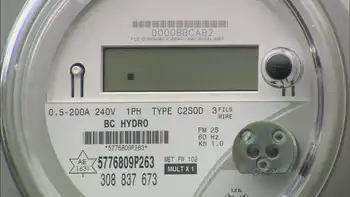Territories introduces reduced power bills
YELLOWKNIFE, NORTHWEST TERRITORIES - Electricity customers in 22 of the Northwest Territories' smaller communities could see less expensive bills later this year, thanks to a new formula the territorial government will use to calculate power rates.
The new formula will reduce power rates in 20 NWT communities — such as Tuktoyaktuk and Colville Lake — that are in the Northwest Territories Power Corp.'s "thermal zone," meaning they rely on diesel-generated power.
Rates will be frozen for two years in most communities that rely mostly on hydroelectricity, like Yellowknife and Fort Smith. Two smaller hydro-serviced communities, Dettah and Fort Resolution, can expect lower rates.
"We expect it will have a positive effect on the communities, expect that it will make communities a more attractive place to live, reduce the cost of living," Industry Minister Bob McLeod told reporters in Yellowknife.
"It will allow them to become more diversified, hopefully attract more business investment."
McLeod said the lower rates is part of a larger package of electrical system changes that favour smaller communities, by making larger centres shoulder a larger share of costs related to running the Northwest Territories Power Corp.
As a result, residential customers in thermal zone communities could see their rates drop from 19 to 79 per cent, while commercial rates in those same communities could be 22 per cent to 80 per cent lower.
The government's steps are in response to recent reviews of the NWT Power Corp. and the territory's electricity system.
The territorial government also announced changes to its power subsidy program, which subsidizes electricity rates in smaller communities to bring them more in line with rates in Yellowknife.
Under the existing program, residential customers in communities with rates higher than Yellowknife rates would pay the Yellowknife rate for the first 700 kilowatt hours used each month. Starting in October, that limit will be raised to the first 1,000 kilowatt hours.
Territorial and federal government customers will not see reduced power rates. The NWT Power Corp. generates roughly 43 per cent of its revenue from the government sector.
Related News

Wasteful air conditioning adds $200 to summer energy bills, reveals BC Hydro
VANCOUVER - BC Hydro is scolding British Columbians for their ineffective, wasteful and costly use of home air conditioners.
In what the electric utility calls “not-so-savvy” behaviour, it says many people are over-spending on air conditioning units that are poorly installed or used incorrectly.
"The majority of British Columbians will spend more time at home this summer because of the COVID-19 pandemic," BC Hydro says in a news release about an August survey of customers.
"With A/C use on the rise, there is evidence British Columbians are not cooling down efficiently, leading to higher summer electricity bills."
BC Hydro estimates…




